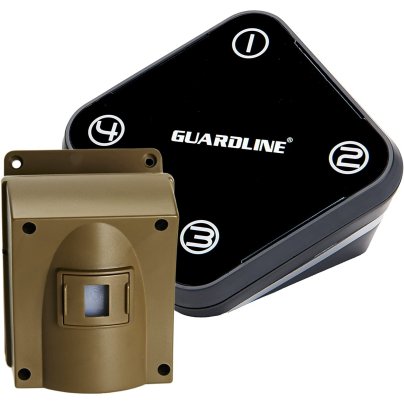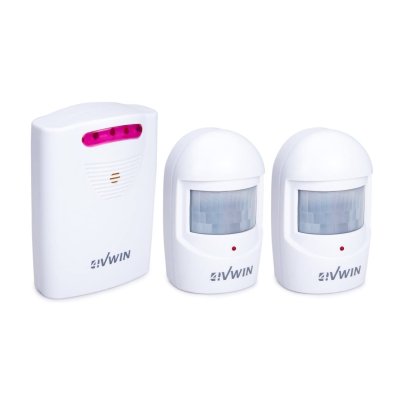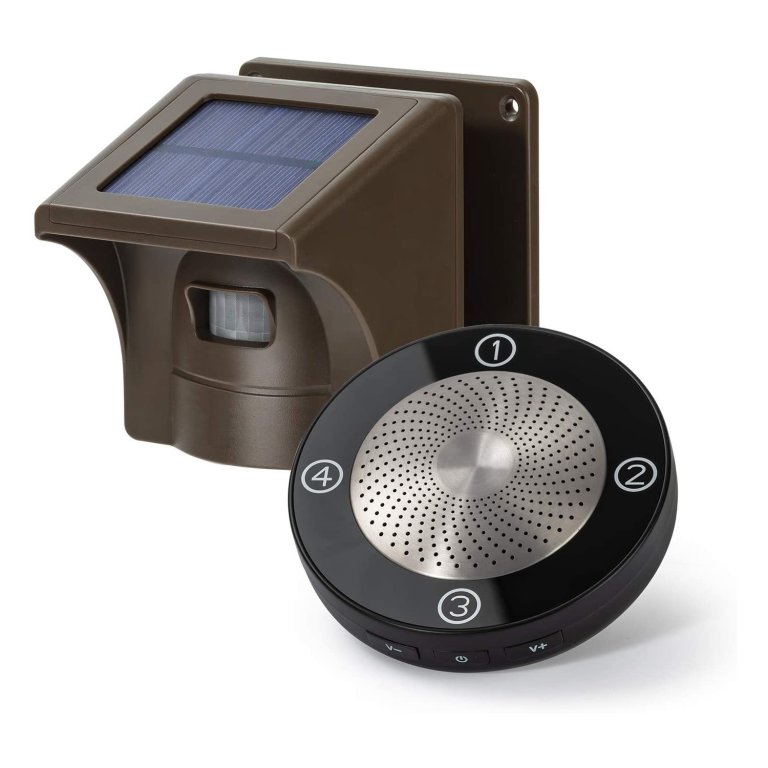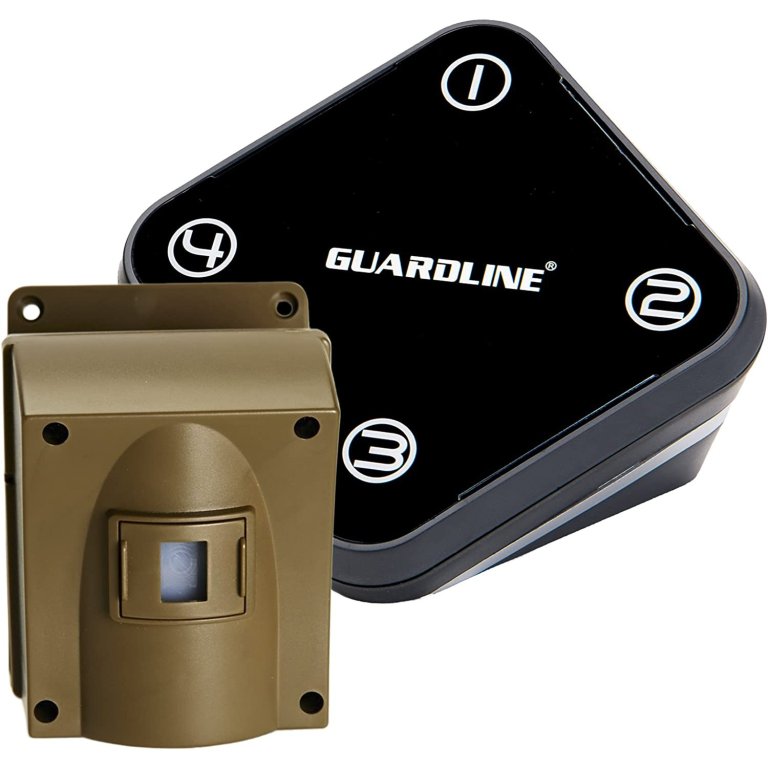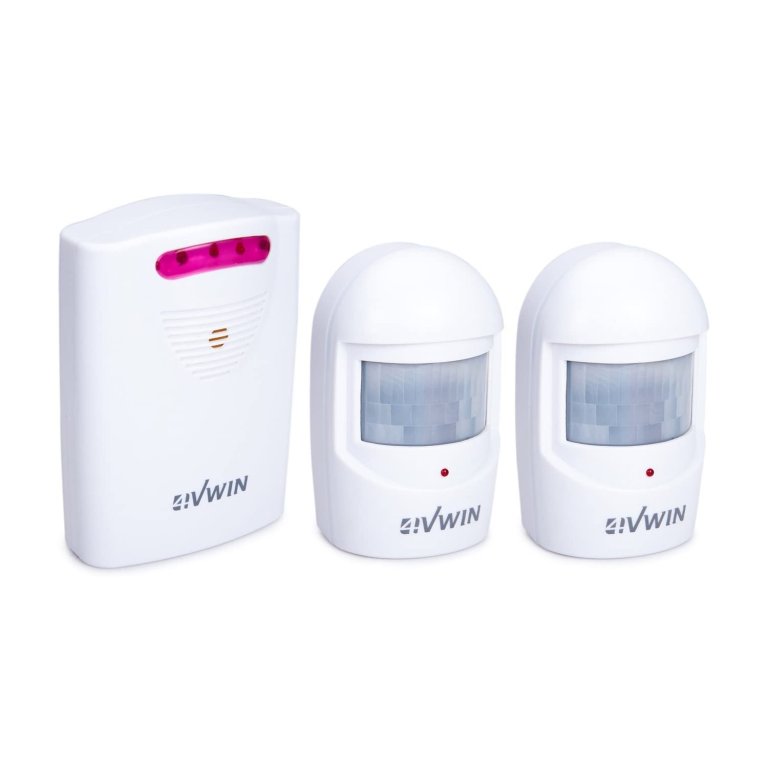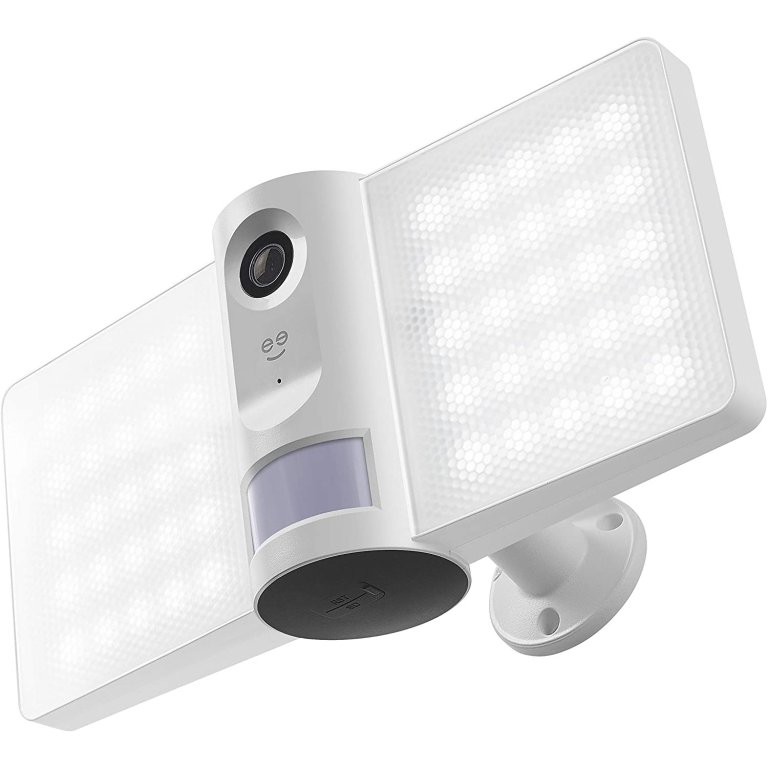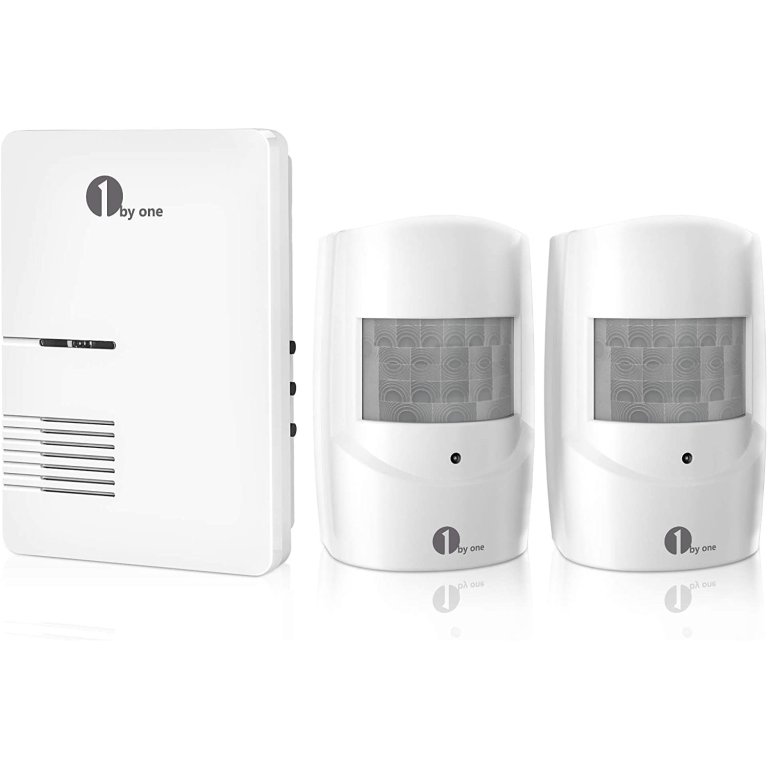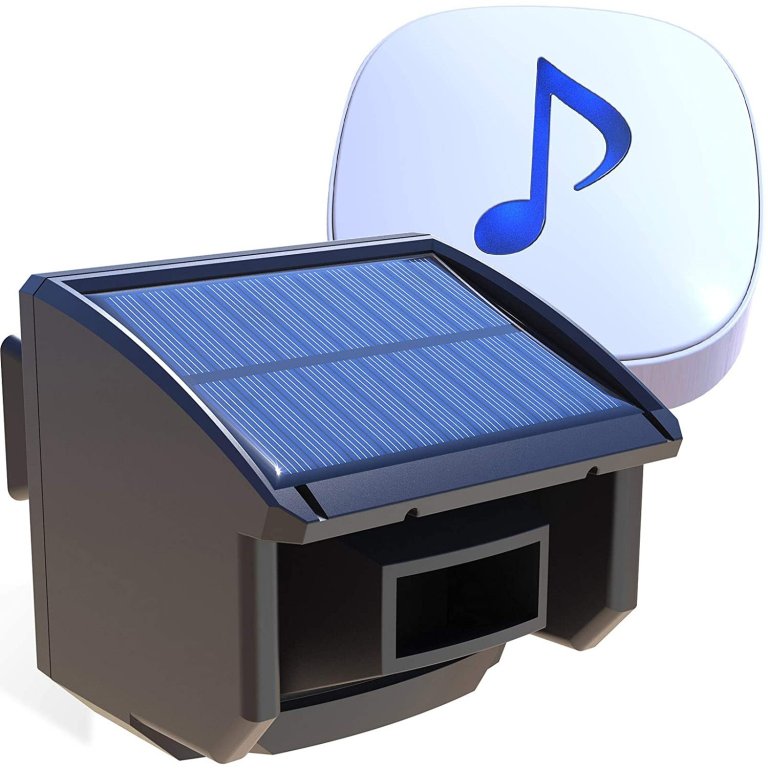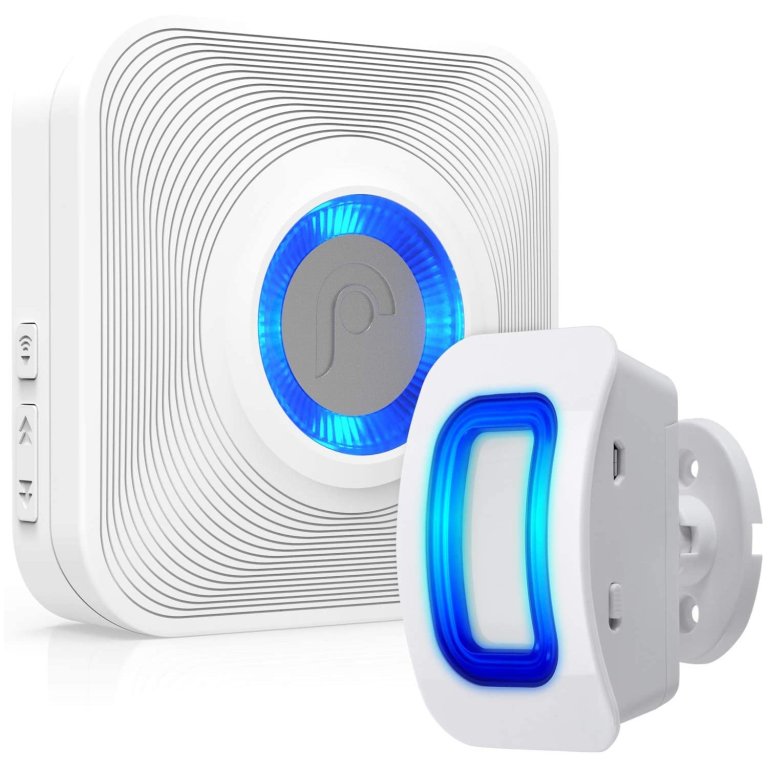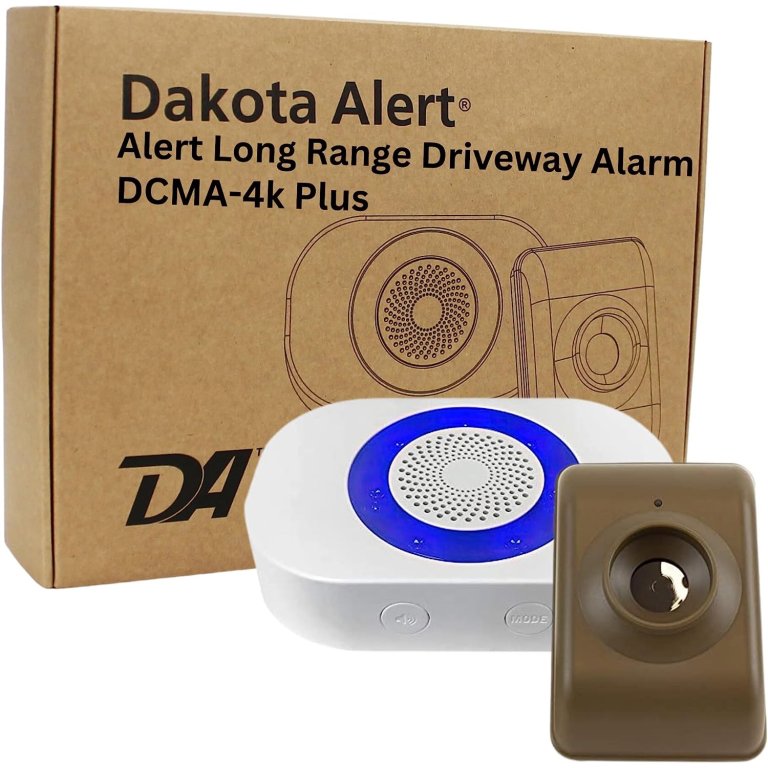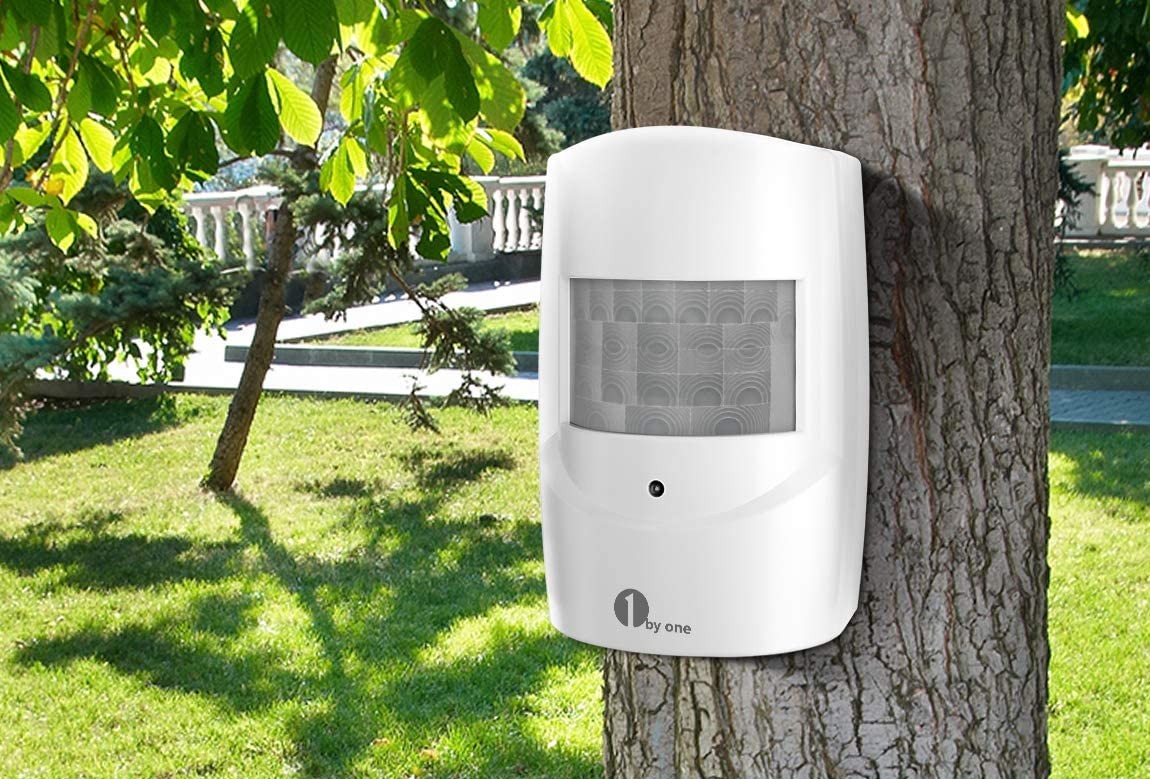
We may earn revenue from the products available on this page and participate in affiliate programs. Learn More ›
Even if you live in an area with a low crime rate, having an extra level of protection between your kitchen and the outside world offers a sense of peace that locked doors just don’t always provide.
The best driveway alarms detect when vehicles, people, or even squirrels cross your property line. Not only can they keep you informed of your family’s comings and goings, but an alarm can alert you when there is an unwanted guest. Below are some of the top options on the market.
- BEST OVERALL: Emacros Long Range Solar Wireless Driveway Alarm
- RUNNER-UP: Guardline Wireless Driveway Alarm
- BEST BANG FOR THE BUCK: 4Vwin Driveway Alarm
- BEST SMART TECH: Geeni Sentry Smart Floodlight Camera
- BEST LONG-RANGE: 1byone Home Security Alert System
- BEST SOLAR-POWERED: Htzsafe Solar Motion Sensor & Plug-In Receiver System
- BEST EASY INSTALLATION: Fosmon WaveLink Wireless Motion Doorbell Sensor
- BEST FOR COLD WEATHER: Dakota Alert Long Range Driveway Alarm
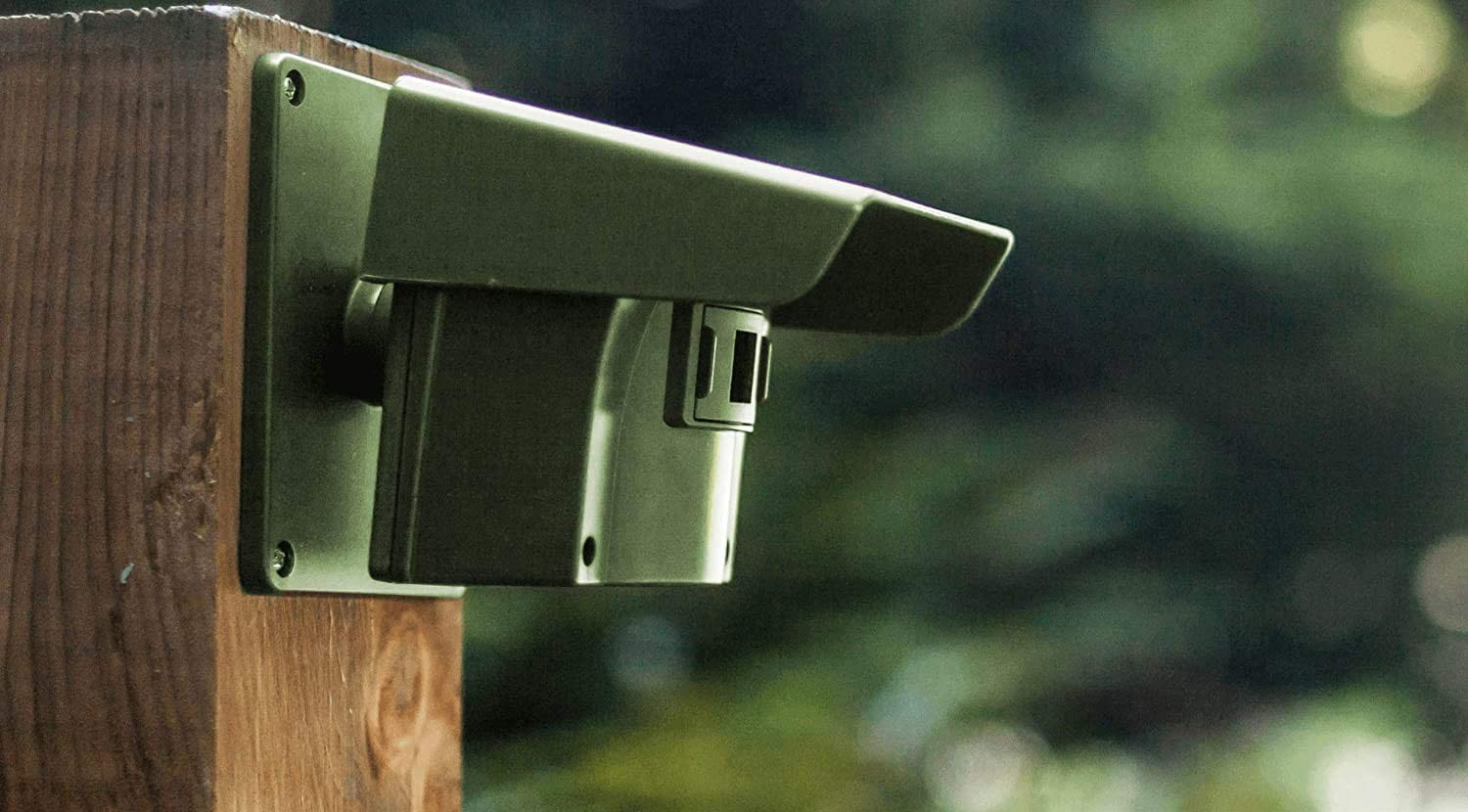
How We Chose the Best Driveway Alarms
When gathering our top picks for this list, we looked at a range of aspects to create a well-rounded set of recommendations for a variety of requirements that shoppers may have. We made sure to include picks that span the multiple power sources available—battery, solar, and hard-wired. We also know that the transmission range is a key factor, so our top products all boast a long range, as well as an impressive detection range from 16.5 feet up to 50 feet, so shoppers can find the perfect model to suit their specific needs.
No one wants to fiddle around with tricky installations. As such, every product on our list is easy to install; some can even be plugged in and ready to go in minutes. Many of our higher-end picks also include adjustable sensitivity and false-alarm prevention, and we even made sure to provide a suggestion for tech-savvy shoppers looking for the ultimate technology this market has to offer.
Our Top Picks
It’s time to start shopping. Keep reading for a selection of some of the best driveway alarms available, organized by category.
Best Overall
Emacros Long Range Solar Wireless Driveway Alarm
Pros
- No batteries required for proper operation; simply a set-and-forget system
- Can be expanded to cover more area; suitable for short or long driveways
- Comes with sensitivity adjustment for preventing unwanted detection
Cons
- Sensors are quite bulky; may take up a lot of space on a post or wall
Product Specs
- Detection range: 30 feet
- Power source: Solar-powered or corded electric
- Security features: Alarm
You’ll never replace a driveway alarm battery again with the Emacros long-range solar wireless driveway alarm system. The passive infrared (PIR) detection sensor can be adjusted horizontally or vertically. It’s powered by a built-in rechargeable lithium-ion battery. While you don’t need to charge the batteries, you can with a 5-volt direct current (DC5V) power adapter if the weather prevents it from charging.
This solar driveway alarm system can be fully expanded to add an unlimited number of sensors and receivers, thus giving you complete coverage of your home. With a long receiving range of half a mile, this weatherproof system will dependably alert you to activity on your property. You can adjust the sensitivity of this solar driveway alarm to keep animals or kids from tripping the wire.
Get the Emacros driveway alarm at Amazon or The Home Depot (3-pack).
Runner-Up
Guardline Wireless Driveway Alarm
Pros
- Adjustable detection sensitivity; keeps children and pets from tripping the system
- Weather-resistant design is suitable for all-season use
- Compact and robust sensors are made for long-term use
- Multiple alarm melodies to choose from to suit individual users’ preferences
Cons
- Animals and excess sunshine can trigger the alarm
Product Specs
- Detection range: 40 feet
- Power source: Corded electric and batteries
- Security features: Alarm
Dependability and weather resistance are just two of the many things you’ll get with the Guardline wireless driveway alarm. This device minimizes false alarms with its adjustable detection option, sunshade, and swivel mount. Wireless and durable, this driveway alarm has a 500-foot range. When an object or person comes within 40 feet of the device’s angled eye, your receiving device will chime just like a doorbell.
The plug-and-play device allows you to easily install it and adjust the volume of the alarm. Plus, you can customize this system to add up to 16 sensors and receivers.
Get the Guardline driveway alarm at Amazon.
Best Value
4Vwin Driveway Alarm
Pros
- Quick setup compared to similar driveway alarms on the market
- Unobtrusive sensor size can be installed on most posts or walls near a yard or driveway
- Long-range connection of up to 350 feet; suitable for short to medium-length driveways
Cons
- No sensitivity settings can be adjusted on this model
- May not be ideal for longer driveways
Product Specs
- Detection range: 25 feet
- Power source: Power adapter for alarm base, batteries for sensors
- Security features: Alarm
While it’s one of the most basic models on the market, the 4Vwin driveway alarm is still a great option for keeping your home safe. This PIR motion sensor is a convenient way to alert you to movement 25 feet away and has a long-range connection of up to 350 feet. This system also includes an alarm with adjustable volume as well as flashing LED warning lights.
However, because it’s one of the lowest-priced models on the market, it doesn’t come with additional features like sensitivity settings.
Get the 4Vwin driveway alarm at Amazon.
Best Smart Tech
Geeni Sentry Smart Floodlight Camera
Pros
- Multiple added features; includes a camera as well as a floodlight for enhanced security
- Streams to smart devices for ease of use and quick adjustments and checks
- No hub needed for proper operation; should be easy to set up once installed
Cons
- Must be hardwired to work correctly; may require some help to install this model
Product Specs
- Detection range: 30 feet
- Power source: Hard-wired
- Security features: Camera, light, alarm, 2-way speakers
If you’re looking for a driveway alarm with bells and whistles, look no further than the Geeni Sentry floodlight security camera. You’ll have total security coverage with this motion-sensing floodlight-and-camera combo that records both audio and video in addition to allowing you to communicate with people outside through a two-way speaker. You can also alert intruders with a loud security siren.
This security camera connects to your phone, Alexa, or Google Assistant so you can check in no matter where you are. This alarm is weatherproof and provides a widescreen 140-degree view.
Get the Geeni driveway alarm at Lowe’s, The Home Depot, or Best Buy.
Best Long-Range
1byone Home Security Alert System
Pros
- Multiple chimes to choose from to suit individual users’ preferences
- Receiver is slim and easy to install; should not take up a lot of space in outdoor areas
- Long communication range; suitable for multiple driveway lengths
Cons
- Sensors sway in the wind if not secure; may not be as secure as some comparable models
Product Specs
- Detection range: 24 feet
- Power source: Plug-in base unit, batteries for sensors
- Security features: Alarm, LED indicator
With a communication range of up to 1,000 feet between each sensor and receiver, the 1byone driveway alarm can be used on the largest of lots. The PIR sensor detects movement within 24 feet of its angled eyes and alerts you using one of three alert options, which are a combination of light and sound. Plus, you have a choice of 36 chimes.
Easy to install, the 1byone can be expanded with up to five wireless sensors. An improved infrared detection chip design makes it more reliable in harsh weather and reduces false alarms caused by wind and rain.
Get the 1byone driveway alarm at Amazon.
Best Solar-Powered
Htzsafe Solar Motion Sensor & Plug-In Receiver System
Pros
- Excellent detection and transmission range; can detect motion up to 50 feet away
- No wiring required for proper installation; should be easy for users to set up
- Eco-friendly compared to other options available; powered via solar panel
- Can be expanded up to 32 sensors for ample coverage; suitable for short to long driveways
Cons
- May be prone to rain damage; may need to be in a covered space to work long-term
Product Specs
- Detection range: 50 feet
- Power source: Solar-powered or corded electric
- Security features: Alarm
Solar-powered driveway alarms are easily an eco-friendly option, and the Htzsafe solar driveway alarm system is no exception. The solar wireless motion sensor never needs replacement batteries because this security system’s lithium-ion battery is charged by a solar panel. The fully weatherproof design allows it to charge in bad weather.
The sensor has up to a quarter-mile of transmission range and a detection range of up to 50 feet with an adjustable sensitivity setting. Expandable with up to 32 sensors, this system can also be adjusted through its four volume levels and 35 melodies. You can even match a melody with a specific sensor so you know exactly which area is detecting motion. Plus, it doesn’t hurt that the kit is easy to install and can be set up and running in minutes.
Get the Htzsafe driveway alarm at Amazon.
Best Easy Installation
Fosmon WaveLink Wireless Motion Doorbell Sensor
Pros
- Sleek and modern design will look great in a front yard or other outdoor space
- Budget-friendly compared to some other options on this list
- Visual alerts for hearing-impaired users; has a built-in LED indicator
Cons
- Sensor sensitivity can cause some technical issues
Product Specs
- Detection range: 16.4 feet
- Power source: Plug-in receiver, batteries for transmitter
- Security features: Alarm, LED indicators
This completely wireless and easy-to-use driveway alarm kit is ready to go after you plug it into an available 110-volt outlet. With motion sensors detecting up to 16.5 feet of distance, the Fosmon WaveLink Wireless Home Security Driveway Alarm can alert the indoor receiver up to 500 feet away.
The alert can be customized by choosing 58 ringtones and volume control levels. The LED lights also flash when someone is approaching, so it’s a great option for people with hearing loss. You can use up to 10 transmitters and receivers to have full protection around your home.
Get the Fosmon driveway alarm at Amazon.
Best For Cold Weather
Dakota Alert Long Range Driveway Alarm
Pros
- Each transmitter has a 100-foot motion-sensing range and 1-mile receiver range
- Can withstand temperatures of -31 to 120 degrees Fahrenheit; suitable for all-season use
- Can be paired with up to 16 receivers for those with long driveways
- Comes with an alert and strobe warning light feature for ease of use
Cons
- Only comes with 1 transmitter; you may need to purchase more units for larger coverage areas
Product Specs
- Detection range: 100 feet
- Power source: Battery
- Security features: Alarm, strobe warning light
Those who need a durable driveway alarm in the dead of winter can rely on this model from Dakota Alert. Made with a long 100-foot motion-sensing range, this alarm can withstand temperatures of -31 to 120 degrees Fahrenheit, making it ideal for all-season use.
This model will detect motion and send an alert to the receiver at distances of up to 1 mile, making it ideal for residential, commercial, or rural areas. For accurate motion sensing, this alarm can be used with up to 16 sensors that can all be paired with the same receiver for ease of use.
The unit includes a 9-volt battery and a 12 VDC output, and the battery should only require charging once a year. Need more? This Dakota alarm comes with four different volume levels and a strobe warning light, making it ideal for those who are hearing impaired.
Get the Dakota driveway alarm at Amazon.
Jump to Our Top Picks
What to Consider When Choosing a Driveway Alarm
It’s time to dive into the various features and capabilities offered by alarm systems. From weatherproof designs that will survive a storm to solar-powered devices that never need replacement batteries, there are a few factors to consider when looking for a driveway alarm system.
Types of Driveway Alarms
While the idea of a driveway alarm is simple, today’s options can seem complex. Among the products available, there are three common types of driveway alarms. All of them can increase your home security and provide more protection for your family, and each type has specific benefits.
Passive Infrared (PIR)
Passive infrared (PIR) driveway alarms have infrared light beams that sense nearby movement using heat. Often referred to as PIR alarms, passive infrared alarms are probably the most common type on the market. Because they detect objects that radiate warmer temperatures, these alarms will sense not only car engines but also animals and people.
When this alarm detects a change in heat patterns, it transmits a signal to the receiver, alerting you of the change. Higher-end models have sensitivity adjustments so your front-yard squirrels are not constantly setting off the system. PIR alarms are generally inexpensive and easy to install, as they usually come in a single unit to mount outside.
Active Infrared (AIR)
Unlike PIR alarms, active infrared alarms (AIR alarms) consist of two parts: the transmitter and the receiver. The transmitter shoots out a beam of infrared light that the receiver picks up. When an object crosses the beam’s path, the receiver is alerted to the interruption and an alarm is sent out.
Usually, people who have these alarms place one part on each side of their driveway to detect movement. The downside to AIR alarms is that the area under watch is very small and specific. Someone could easily walk around the driveway and not be detected. Still, it may be better than no security system, and it may be a good starting point for a larger home security system.
Magnetic Probe
The third most common type of driveway alarm is the magnetic probe. This model is built out of an encased PVC pipe that has a metal detector hidden inside. The pipe is buried a few inches partially underground next to your driveway and is triggered whenever a vehicle crosses its path. That alert is then transmitted to an indoor receiver.
Because the detector only senses metal, there is less risk of false alarms. Both PIR and AIR alarms can falsely detect rustling leaves or a friendly neighbor as an intruder. While it can’t detect everything, magnetic probe alarms are reliable in letting you know if there’s a vehicle in your driveway.
Power Source
In order for the sensor to function properly, an alarm must remain powered. Today’s models can be powered by three sources: batteries, solar energy, and your home’s electricity.
- Battery-powered alarms tend to have the shortest lifespan and require you to change the batteries regularly. Experts suggest using rechargeable batteries so you don’t have to buy new batteries.
- Solar-powered alarms are great because you can essentially set them up and forget about them. However, they can sometimes trigger false alarms during overcast conditions.
- Electricity-powered alarms are powered by an outlet. They require either a long power cord or placement closer to your home, which makes them a little less versatile.
Range of Transmission
The transmission range of a driveway alarm refers to the maximum distance you can place the sensor from the receiver and still get a signal. Typically, people place the receiving device inside their home, so it helps to choose a product that can function properly while indoors.
Before you start shopping, determine the spot where you’ll mount and install the sensors so you can decide how much distance you need. Most sensors have a range of at least 500 to 1,000 feet. A range of up to 50 feet is considered very short.
Weatherproofing
It’s good to look out for driveway alarms that can function in all kinds of weather. These alarm systems have moisture protection and are less likely to give false alarms whenever the weather picks up. Some solar-powered alarms have been known to do that.
Other weatherproofing features to consider include angled sensors that help prevent false alarms in more intense weather conditions. If weather is a concern, look for products labeled “waterproof” or “water resistant.” Since the magnetic probe alarms are buried underground, they will be the most weatherproof. If you live in an area with a lot of rainstorms or snowstorms, having something that can stand up to the toughest winds is important.
Motion Detection and Sensors
Not all driveway alarms detect the same things, as the kind of motion detection and sensors vary. PIR models use heat patterns to find objects, and AIR models are triggered when someone hits the infrared beam. Others, like the magnetic probe type, can only detect metal. Before shopping, it’s important to consider what kinds of things you want detected, whether it’s people, animals, or cars.
In addition, check to make sure the driveway alarm system you are considering has sensors that can properly assess your driveway. You may want an AIR model that spaces across the driveway’s width or a PIR model that will be placed in one spot. Some products have an expandability option and can be customized to fit any home.
False Alarm Prevention
The biggest complaint with driveway alarm systems is that they can trigger false alarms. As previously stated, solar-powered devices can be set off by a changing weather condition, while heat-sensing PIR devices can be triggered by children or animals running by.
Because of this risk, some brands are manufacturing their alarms with sensitivity settings that allow you to adjust the range of the sensors to reduce the number of false alarms in a certain area. These settings can usually be changed by moving a dial on the unit.
This new technology has made driveway alarms more effective than ever before, and it’s a great feature if you have a lot of high-traffic areas around your home.
Smart Technology
Some newer models have smart features like voice control, security cameras, and notifications you can receive on your phone through a downloaded app. A few high-end products are compatible with popular smart-home assistants.
Other features include sensitivity control, weatherproofing, hassle-free installation, multiple alarm sounds, a choice of tones, and styles that can be easily hidden out of view. You also can find alarm systems with long battery life and the ability to include additional sensors for greater security. As with any product, the additional features can increase the cost of the alarm system.
Ease of Installation
Pretty much every kind of driveway alarm system requires do-it-yourself installation. Some are easier than others, so it can be helpful to check the installation requirements prior to purchasing to make sure you have the necessary tools.
Infrared alarms are generally easy to install as long as the distance between the sensors is within the correct range and the two parts are facing each other properly, according to the product’s instructions. Probe sensor alarms, on the other hand, are a little more difficult. You need to bury the probe underground and make sure it’s at least 25 feet away from a road so it’s not triggered by car traffic.
The Advantages of Owning the Best Driveway Alarm
While no one wants to believe their home is vulnerable to unwanted guests, a high-quality driveway alarm can help eliminate vulnerabilities and provide real security. There are benefits to any kind of home security, and driveway alarms stand out among them because they are affordable, simple to use, and easy to install. If you’re just beginning to create a home security system, driveway alarms are a great place to start.
Here are some of the advantages of owning a driveway alarm:
- You will know when someone is approaching your home.
- It could deter intruders and burglars from trying to get into your home.
- The alert could help you prevent a potentially unsafe situation.
- The alarm may easily sync up with your other home security devices.
- You can set some driveway alarms’ sensitivity settings so you receive more accurate alerts.
- You can monitor your home’s surroundings.
- You can set up multiple sensors to cover a larger area.
FAQs
Now that you’ve seen what is offered by some of the best driveway alarm systems, you might have a few more questions about alarm selection. Below are answers to some of the most common questions about driveway alarms to help you choose the most high-quality option for your home’s security system.
Q. Why should you use a driveway alarm?
A driveway alarm can alert you to who’s approaching your home, which can provide a level of security.
Q. How does a driveway alarm work?
Driveway alarms use a sensor and a receiver to detect motion and alert the recipient of that motion.
Q. Can a driveway alarm detect people?
PIR and AIR alarms can detect people. Magnetic probe alarms can only detect metal.
Q. Do pets trigger a driveway alarm?
If you have a PIR or AIR alarm, then yes, it can be triggered by a pet. Some devices come with a sensitivity setting to reduce the possibility of pets triggering the sensor.
Q. Where should I install a driveway alarm?
It depends on your driveway, but generally, you want to install the system far enough away from the road so it isn’t triggered by traffic.

